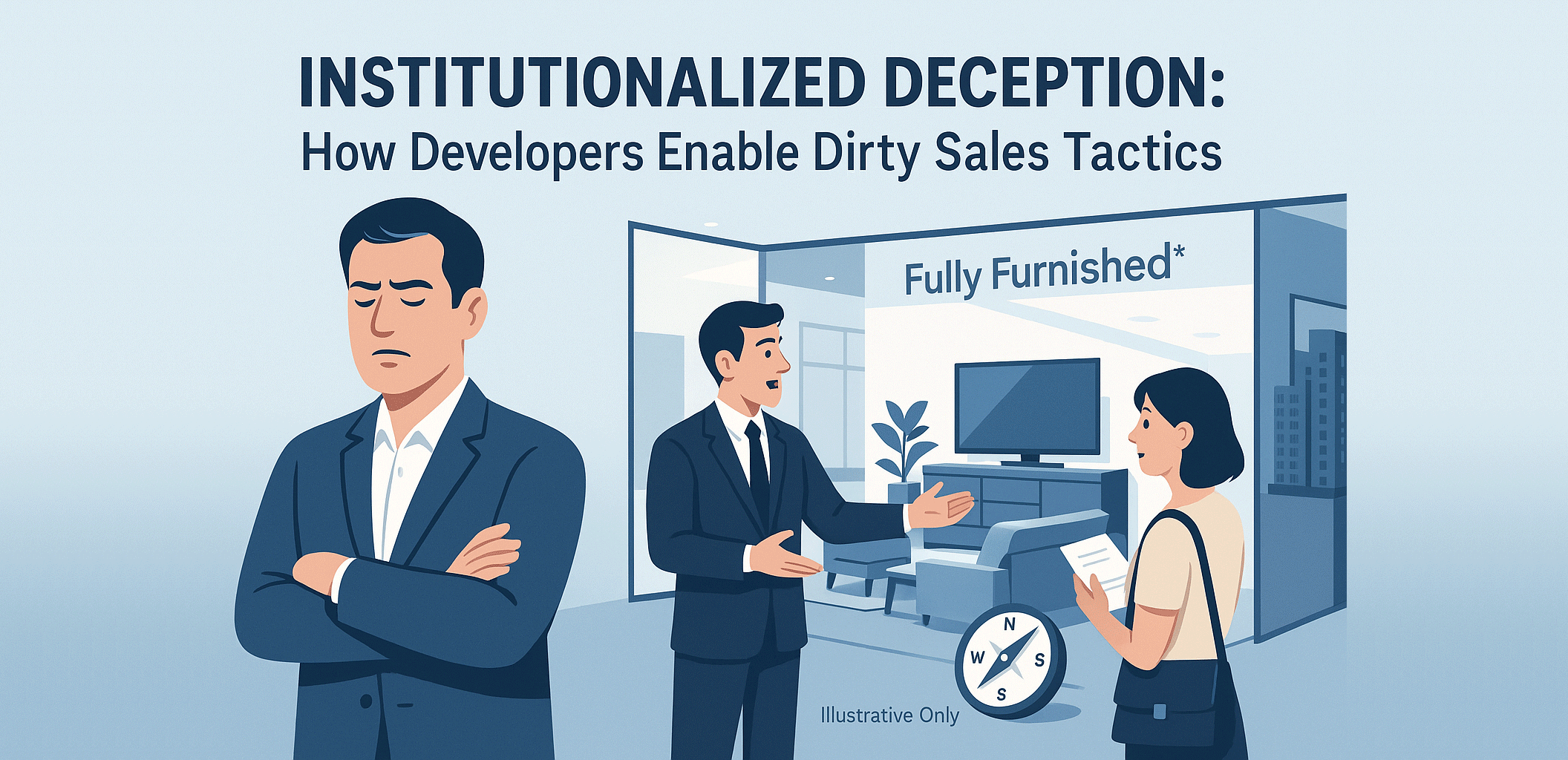Institutionalized Deception: How Developers Enable Dirty Sales Tactics

Sales are the lifeblood of property development, but in the frantic rush for volume, some developers cross a dangerous line: they look away.
They don't execute the fraud themselves; they outsource the pressure to agents. They tolerate whispering half-truths, over-promising "fully furnished" illusions, and bending floor plans—all while feigning ignorance when the buyer discovers the deceit.
This is an epidemic of institutionalized deception: developers chasing bookings by tolerating—or silently encouraging—dishonesty. The cost is the rapid decay of buyer trust, agent integrity, and the reputation of the entire industry.
Let’s unpack this unethical shortcut and explain why silence is complicity.
1. The "Don't Ask, Don't Tell" Sales Culture
For certain developers, targets are the only truth. They cultivate an unspoken, toxic rule: "As long as the SPA is signed, the truth is the agent's problem."
This creates a dangerous environment where management provides:
- Zero control over sales messaging or scripts.
- No mandatory training on legal representation.
- Zero penalties for misrepresentation, provided the booking comes through.
The showroom becomes a grey zone. Agents are forced to improvise, and those under pressure quickly learn that lying is rewarded while integrity is an obstacle.
2. The Illusion Trap: Your Stage, Your Liability (Exploiting Buyer Ignorance)
The most common bait is visual deception and the exploitation of the buyer's faith in the verbal promise. The agent assures the buyer, "Everything you see in this show unit is included." Buyers trust the spoken word.
The Developer’s Trap Relies on This Legal Blind Spot: The buyer does not know that all promises, inclusions, and specifications must be written in black and white within the Sale and Purchase Agreement (SPA). Any verbal assurance, promotional image, or show unit feature not explicitly listed in the contract addendum is legally worthless.
Months later, at vacant possession, reality hits: TV is gone, cabinets are downgraded, and fixtures are missing.
The Developer's Defense: "We never said that; the agent misrepresented. And besides, it's not in the contract."
This defense is bankrupt. If the lie happened on your showroom floor, using your branding, and was made for your financial benefit, you are not a bystander—you are the producer of the fraud. You supplied the illusion and exploited the buyer’s legal ignorance to secure a commitment.
3. Directional Fraud: The Compass Trick
The deceit isn't always verbal; sometimes, it's engineered. The agent, needing to close a deal on an undesirable west-facing unit, quietly adjusts the compass on the scale model to sell a south-facing illusion.
- The buyer pays for sunlight that never arrives.
- The developer gets the booking.
- The agent is sacrificed when the truth emerges.
This is fraud by omission. It persists only because developers prioritize the result over the oversight, allowing their showrooms to become tools for technical deception.
4. The Legal Dodge: "Third-Party, Not Our Fault"
When the buyer files a dispute or threatens legal action, the unethical developer takes cover behind contractual technicalities: "They are outsourced, not our staff. We didn't instruct them to say that."
Yet, these same developers:
- Provided the show units and the scale models.
- Approved the entire marketing collateral.
- Directly benefited from the fraudulent sale.
This is not outsourcing; it's willful blindness. By refusing shared liability, they push the legal exposure onto the agency, forcing honest agencies to compete against a system that tacitly endorses liars.
5. The Long-Term Fallout: Trust Is Unmarketable
Every lie tolerated in the pursuit of volume erodes the foundational trust of the market.
For Buyers: They lose faith in all developers and all future agents, assuming deceit is standard practice.
For Honest Agents: They lose sales to unethical competitors whose lies are implicitly endorsed by developer silence, damaging the profession's credibility.
For Developers (Themselves): Short-term booking wins are exchanged for long-term backlash—lawsuits, refund demands, and skepticism that plagues future launches, no matter how clean they are.
Final Verdict: Integrity Must Be Supervised
A developer who looks away is not neutral—they are complicit in the deception. Institutionalizing fraud as "hustle" is short-sighted and corrosive.
Sales leadership means installing guardrails, not offering excuses. A responsible developer must:
- Enforce clear scripts and legal disclosures.
- Blacklist agents caught misrepresenting.
- Audit their own showrooms using mystery shoppers.
- Accept shared liability for representations made on their premises.
A clean sale builds loyalty and long-term value. A dirty one builds lawsuits and distrust. In the long run, trust closes more deals than trickery ever will.











































































































